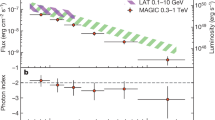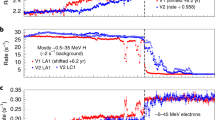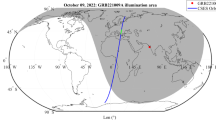Abstract
THE large, sudden increase in cosmic-ray intensity between the hours 0300 and 0400 G.M.T. on February 23 was observed at Hobart, Tasmania, Australia, and also at the Australian National Antarctic Research Expedition's bases at Macquarie Island and Mawson, Antarctica. At the same time radio fade-outs, ionospheric and magnetic disturbances were recorded. The cosmic-ray increase resembles those observed in other places on four previous occasions in association with solar flare activity, namely, on February 28 and March 7, 1942, July 25, 1946, and November 19, 19491.
This is a preview of subscription content, access via your institution
Access options
Subscribe to this journal
Receive 51 print issues and online access
$199.00 per year
only $3.90 per issue
Buy this article
- Purchase on Springer Link
- Instant access to full article PDF
Prices may be subject to local taxes which are calculated during checkout
Similar content being viewed by others
References
See Elliot, H., “Prog. in Cosmic Ray Physics” (North-Holland, 1952).
Firor, J. W., Phys. Rev., 94, 1017 (1954).
Morrison, P., Cornell University, Report to Conference on Cosmic Rays, Guanajuato, Mexico, September 1955).
Author information
Authors and Affiliations
Rights and permissions
About this article
Cite this article
FENTON, A., McCRACKEN, K., PARSONS, N. et al. Cosmic-Ray Increase observed at High Southern Latitudes on February 23, 1956. Nature 177, 1173–1174 (1956). https://doi.org/10.1038/1771173a0
Issue Date:
DOI: https://doi.org/10.1038/1771173a0
This article is cited by
-
Solar flares, concurrent cosmic ray bursts and subsequent geomagnetic storms
Acta Physica Academiae Scientiarum Hungaricae (1958)
-
Solar flare cosmic rays and their propagation
Il Nuovo Cimento (1958)
Comments
By submitting a comment you agree to abide by our Terms and Community Guidelines. If you find something abusive or that does not comply with our terms or guidelines please flag it as inappropriate.



